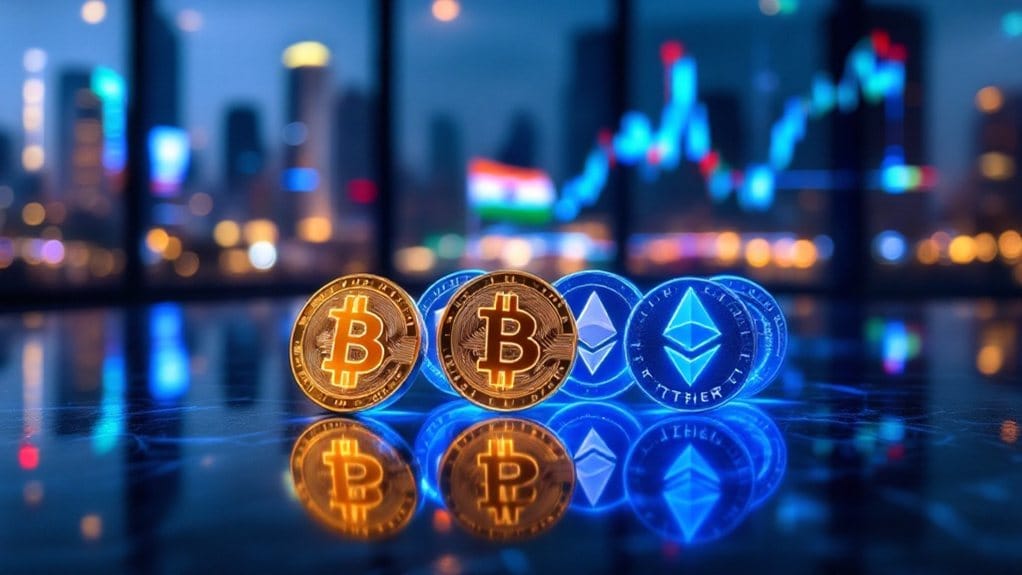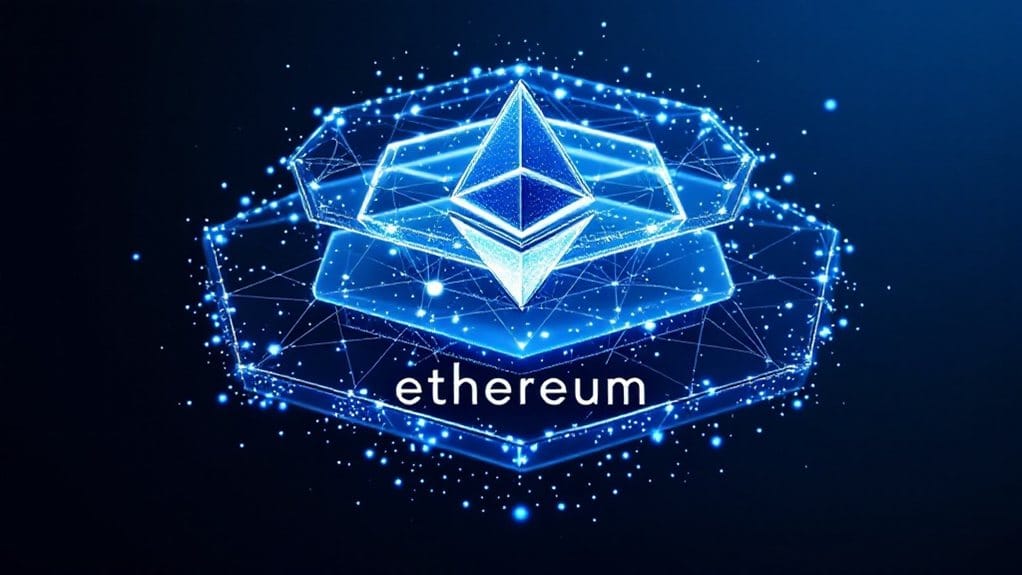Cryptocurrency prices in India are determined by multiple interconnected factors, including regulatory developments, market dynamics, and technological infrastructure. Major exchanges like CoinSwitch and Wazirx facilitate trading of Bitcoin, currently valued at ₹87,074.43, alongside other digital currencies. The market experiences significant volatility due to regulatory uncertainty, with recent data showing a 20% Bitcoin decline amid inflation concerns. Understanding these fundamental elements reveals the complex mechanisms driving India’s cryptocurrency valuations.

As India’s digital economy continues to evolve, cryptocurrency prices in the country reflect a complex interplay of regulatory uncertainty, market dynamics, and technological adoption. The cryptocurrency market in India operates through established platforms like CoinSwitch, Coinbase, and Wazirx, where investors can trade popular digital currencies including Bitcoin, Ethereum, and Tether, with Bitcoin maintaining the highest market capitalization and trading volume. The current Bitcoin value of BTC $87,074.43 demonstrates strong market performance.
The pricing mechanisms of cryptocurrencies in India are influenced by multiple factors, including global market trends, domestic regulatory developments, and the ongoing deliberations surrounding the Cryptocurrency and Regulation of Official Digital Currency Bill, 2021. While cryptocurrencies remain legal following a favorable Supreme Court ruling against banking restrictions, the lack of clear regulations creates price volatility and market uncertainty. Recent market data shows Bitcoin dropping 20% amid growing concerns about inflation.
Market liquidity plays a significant role in determining cryptocurrency prices, with higher trading volumes generally leading to more stable valuations. Popular exchange platforms like ZebPay and Wazirx facilitate substantial daily trading volumes, particularly in Bitcoin transactions, while also offering trading pairs for alternative cryptocurrencies like Ethereum and Ripple, which have gained significant traction among Indian investors. Some investors are exploring self-directed IRAs as a way to include cryptocurrencies in their retirement portfolios.
The underlying blockchain technology, which guarantees secure and decentralized transactions through advanced cryptography, forms the technological foundation for cryptocurrency pricing. The mining process, particularly for Bitcoin, requires significant computing power and contributes to the general cost structure, while the limited supply of certain cryptocurrencies influences their market value through basic supply and demand principles.
Economic factors, including the growing adoption of digital payment solutions and the potential for low-cost international remittances, continue to drive cryptocurrency demand in India. Global economic conditions, technological advancements in blockchain infrastructure, and increasing adoption by businesses also impact price movements.
Despite the current regulatory ambiguity, experts anticipate long-term growth potential in the Indian cryptocurrency market, supported by the country’s rapid digitization and increasing awareness among investors about digital assets.
FAQs
How Do I Report Cryptocurrency Gains in My Indian Tax Returns?
Cryptocurrency gains must be reported using ITR-2 for capital gains or ITR-3 for business income under Schedule VDA, with profits taxed at 30%.
Taxpayers need to maintain detailed transaction records and calculate gains using fair market value at disposal.
Documentation requirements include:
- Trading history and purchase receipts
- TDS records for transactions above ₹50,000
- Calculation method (FIFO/average cost basis)
- Payment verification through Income Tax Portal
Which Indian Banks Currently Allow Cryptocurrency Transactions?
Indian banks generally do not directly facilitate cryptocurrency transactions due to regulatory uncertainty.
However, some private banks like ICICI, Axis Bank, and Kotak Mahindra Bank allow transfers to certain regulated crypto exchanges through payment gateways. These transactions typically require additional verification and may be subject to monitoring.
Users can also utilize P2P platforms and international exchanges that partner with Indian payment processors while adhering to KYC norms.
Are Cryptocurrency Mining Profits Legal to Earn in India?
Cryptocurrency mining profits are legal to earn in India, subject to a 30% flat tax rate on gains.
The Supreme Court’s 2019 ruling lifted previous restrictions, confirming the legality of crypto-related activities.
While mining itself requires no specific permits, miners must declare their earnings under the Income Tax Act 1961, either as business income or other sources, with the cost of acquisition considered zero for tax purposes.
What Documents Are Needed to Start Trading Crypto on Indian Exchanges?
Trading cryptocurrency on Indian exchanges requires several crucial documents for KYC compliance.
Primary requirements include a PAN card and Aadhaar card for identity verification, along with address proof through utility bills or bank statements.
Additional documents needed are:
- Bank account details for fund transfers
- Recent photograph
- Valid email address and mobile number
- Government-issued photo ID (passport/driving license/voter ID)
All documents should be clear, current, and in digital format.
Can NRIS Invest in Cryptocurrency Through Indian Exchanges?
NRIs can legally trade cryptocurrencies through Indian exchanges like CoinSwitch and WazirX, subject to compliance with both Indian and local country regulations.
They have access to over 300 cryptocurrencies and benefit from competitive INR conversion rates.
While there are no specific trading limits, NRIs must pay 30% capital gains tax on profits and 1% TDS on qualifying transactions, while adhering to RBI’s repatriation guidelines.









